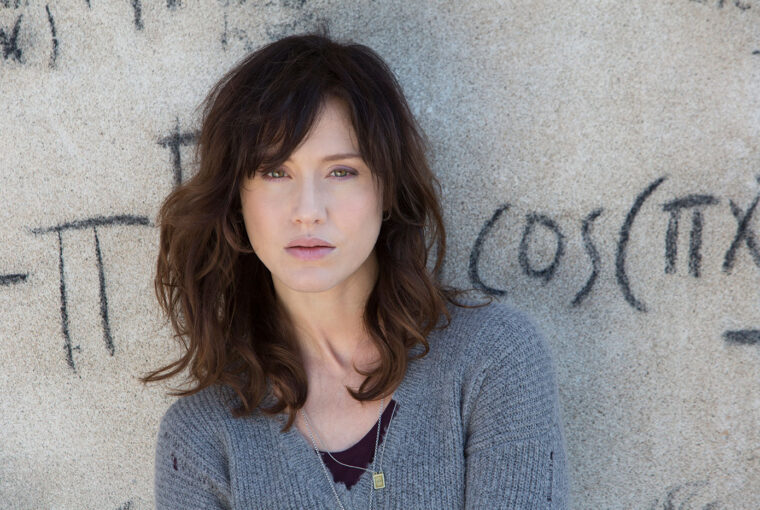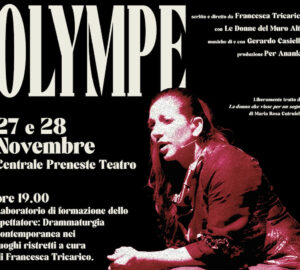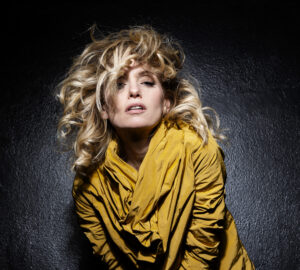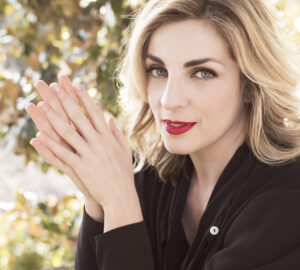GABRIELLA PESSION – «I regained my one’s sense of freedom»
Green eyes and a face which may be natural or turn into a portrait of the past. Talking with her, two qualities immediately come out: limpid and volcanic. The actress has recently interpreted Tosca in the TV series “Oltre la soglia”, making a lasting impression on the heart and the mind of who have been following it.
by Maria Lucia Tangorra

What value has “Oltre la soglia” for you and for what concerns the generalist TV network?
Daniele Cesarano – director of the fiction Mediaset and man of great prominence and TV culture – wanted to raise the bar. It is a totally new work since it firstly sets at the centre a protagonist who breaks out of the module even compared to our local TV – she is schizophrenic and at the same time one of the heads of a hospital department. We are talking about an unconventional female role, often politically dishonest, sometimes rough and simultaneously empathic, very tender and faint, and this was a chance. The intention was to reproduce on the small screen some obscure areas which belong to the human nature. We are confronted with a paradoxically true character since there would not be a psychiatric schizophrenia, and in this sense she is a superhero, who faces life’s transience and the imperfection. Moreover, in this project he had the courage to face up the delicate subject of mental illness among the teenagers.
Why is it still not possible to legalize this issue?
Mental illness is intangible, it is a “monster” that one has inside and which one may try to hide until it does not explode. It is something covered up in the soul which is often ignored, even because of our cultural heritage. There is still somebody who thinks that you go to the psychologist because you are mad and this is a very gullible position, which derives even from the scanty information on the matter. We are afraid of what we do not see and we have wanted to make that “monster” visible.
What did you discover thanks to Tosca?
During my 23 years of profession, it is the character who absolutely touched me the most. Shooting this series, I lost a lot of vanity. To interpret it, I laid myself bare, I have no make-up, I had not my hair combed and in the last two episodes I am badly upset. I had no fear since I desired to render really authentic the illness experience and what does it mean. I could not do it worrying about my physical aspect.
Now you are on tour for the second year with “After Miss Julie” (directed by G. Solari). Presenting it, you declared: «I wanted to choose a character who had a value to me even to make me fall in love again with my job». Did it happen?
After have been dealing with TV for years, I had the necessity to stop and to dedicate myself to something which would take me back to the essence of an actor’s job. To be concentrated on a scene for 15 hours, forgetting to eat since you want to make it perfect from every camera angle, is an opportunity. In this sense, the actor is a doctor of the soul, because he interprets a character and he makes this character to meet a part of himself. I did not find this wonder linked to my profession even because of the tight times on fiction’s set. I’ve crazily loved Tosca since she made me fall in love again, but she arrived after many years of repetitive TV with projects which did not leave any sign. “After Miss Julie” is included in this research started not long ago, when I saw it in London, I developed a deep interest in Marber’s text, I bought the copyrights, I had it translated and after having considered several options, I decided to realize it with the theatre Franco Parenti.
Your first important theatre experience was with “Storia d’amore e d’anarchia”, directed by Wertmüller. What did it give you?
It was a formative experience of my artistic path. I met Giuliana De Sio – one of my dearest friend – and Elio, having relations with high-talented people and it does not happen every day. And Lina is an absolute genius.
You shot three films in Spain, what memories have you got?
Wonderful, I felt really welcomed in a group. I shot in Barcelona the comedy “Mucho Mejor” and in Madrid “Le tredici rose”, a very important film for the theme, since it reminded the thirteen girls executed by the Francoists. It frightened a lot the consciences in Spain, since it came up with an issue that people had tried to forget.
What triggered in you the awareness as a woman and artist in these 23 years of career?
Without any doubt I try to do a personal path. I produced the theatre project in which I believed, I interpreted the best role ever for the small screen and now I’m writing a film.
So, according to you, in this historical-cultural period is it right to fetch what you love?
Totally. I want and create everything I do. I have a successful career, I cannot complain, however, to be sincere, it was not easy at all. I gained with extreme efforts what I realised, making lots of screen tests, even in the United States. It was an idea of mine, with Garbo Productions, I worked on a thriller series called “Il debito”, I do not know if it will concretize, but we undertook a lot. Parallel to this, I ordered six synopses for another project, “The Tide”, shoot all in English.
What walls have you pulled down?
I try to pull them down every day, since we live in a society where it is more important how you show yourself and how strongly you scream rather than what you want to transmit. According to my manner to live this profession, to pull down the walls means to find your own independence and identity, which should be coherent with yourself, apart from the market laws, which request you to do something which does not correspond to you. This is very hard since it may cause a stop, which can last some months and it means to assume huge risks. I have a pulsion to be independent as an artist.
What are, instead, the turning points which changed the perception of yourself?
Despite someone tried to give me some labels, it is impossible to do it because I proved to be independent of what concerns my path and my mind. The perception changed by the actions, even going towards an unconventional direction, which made me stop for 17 months, creating to me lots of difficulties since I said some “no” which maybe I should not have said. Doing so, I probably dissatisfied somebody and I assumed all responsibilities of even unpopular choices. But today I am happy.

Once you affirmed you missed the sense of freedom, according to what you are telling us, have you got it?
Yes, I regained possession of it. It is like a free fall from an airplane, you have the air on your face, you are afraid, but it is amazing because you see everything from afar, with another perspective and you open new horizons to yourself. Even my husband works in the United States now, (he entered the cast of Grey’s
Anatomy, nda) and my son and I will catch up with him soon. Going to Los Angeles was not in my plans, it will be another chapter of my life. I do not know what it will happen, but I find it is more interesting – as a person and temperament – to have this possibility to explore rather than the security given by repetitive things, but then you find yourself, at the end of your existence, having done a lot but not what you have really wanted to realize, since you had not the courage to do it.
What has not been understood about you yet?
Everything. I set my mind at rest for this. I am not pop, I find many difficulties in collocating myself and this may lead to be misunderstood, but I believe that, in the long term, it will bear its fruit, if I will have to give them – she humbly affirms – otherwise I would have carried on a life consecrated to my artistic research which, as far as I am concerned, in more important than to carry out a protected path.
We conclude this “travel” by touching on a delicate subject. “Voci” by Giraldi deals with the question of the violence covered by the familiar silence. Given your sensibility, what do you think it is possible to do at least to reduce this phenomenon?
I realized a lot of campaigns on this subject and the only reason why I chose to interpret Rossella (freely inspired by the figure, really existed, of Ernestina Paper, nda) in the homonym Rai fiction, was properly for what she represented. In the twentieth century, she was the first woman who denounced the domestic violence by her husband and who claimed her dignity. To the same theme belongs “L’amore rubato” made out of a Maraini’s novel. I believe that everything comes from the family unit. I have a son to whom I am already teaching the respect of himself and of women, that he does not have to raise his voice and that the female figure is physically (not in other fields) weaker against the man’s power. The data concerning women’s killing are disconcerting, we are still living in a strongly male chauvinist world. The conviction that a woman may deserve similar actions still survives. We should listen to those who have the courage to denounce, a thing which too often is not considered seriously.
Gabriella Pession is on tour with the show until the end of January. Soon we are going to see her in the film “Da domani mi alzo tardi” made out of the homonymous novel by Anna Pavignano, screenwriter of several films (among whom “Il Postino”) and partial life-companion of Massimo Troisi.










